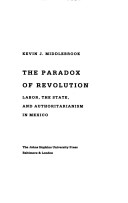"The paradox of social revolution:" writes Kevin Middlebrook, "is that popular mobilisation and socio-economic transformation frequently give rise to a new form of authoritarian rule as revolutionary elites expand and centralise political power." The remarkable resilience of many post-revolutionary authoritarian regimes, he notes, is due to the successful consolidation of a governing coalition in which mass actors such as workers and peasants play a central, though subordinate, part. This important interdisciplinary work unravels the paradox of social revolution in the Mexican case by examining organised labour's participation in politics and economic development from the 1920s through the early 1990s. Middlebrook shows that both state-centered and society-centered analytic approaches are essential to understanding how Mexico's 1910-1920 revolution gave rise to a durable authoritarian regime in which the governing elite maintained a strong base of popular support while simultaneously imposing significant constraints on mass participation.
By demonstrating organised labour's central importance in the formation and evolution of Mexico's distinctive authoritarian regime, he lays the basis for a major reinterpretation of key features of 20th-century Mexican politics. At a time when the Mexican regime faces unprecedented challenges, this book explores both the legacies of post-revolutionary authoritarian rule and the complex relationship between labour politics and democratic regime change.
- ISBN10 0801849225
- ISBN13 9780801849220
- Publish Date 1 April 1995
- Publish Status Out of Stock
- Out of Print 22 December 1999
- Publish Country US
- Imprint Johns Hopkins University Press
- Format Hardcover
- Pages 424
- Language English
